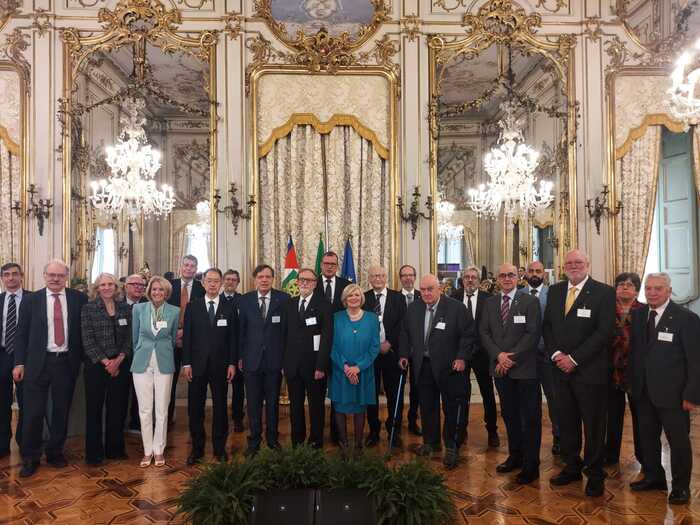Enlarge image
The Leopoldina, the National Academy of Sciences, calls for a rapid move away from fossil fuels
Photo: Emmanuele Contini / IMAGO
In less than four weeks, the heads of state and government of the world's seven most important industrial nations, the G7, will meet for a summit.
The national science academies of the G7 have now given particular emphasis to certain topics with a joint statement - including climate protection, protection of the oceans and the so-called cryosphere, the entirety of ice and snow in the climate system.
more on the subject
G7 meeting of energy and climate ministers: Despite climate promises, the fossil fuel party continuesA comment by Susanne Götze
On Tuesday morning, the Leopoldina, the National Academy of Sciences, presented the letters to the federal government.
In it, the institutions also justify the special responsibility that the G7 have in overcoming the climate crisis.
The G7 countries are responsible for almost half of global cumulative emissions.
And they currently emit about 25 percent of annual global CO₂ emissions.
"All major emitters have an obligation to use their economic and technological strength to lead the world in efforts to achieve the goals of the Paris Agreement," the statement said.
Measures must
now
be implemented
The academies continue to write that immediate action is necessary: "Due to the relatively long timescales and the far-reaching technological and social change required, it is particularly important to implement and adapt the measures now in order to achieve independence from fossil fuels."
With a view to the climate targets, a few points are particularly important:
Many sectors would have to be electrified quickly, leading to an increasing demand for electricity.
A "fundamental transformation" of the world's energy supply systems is necessary.
"More than ever" it is important to focus on renewable energy sources - especially solar and wind energy, which are already available today at competitive costs.
more on the subject
New solar boom in Germany: This is how the solar revolution can still succeedBy Philip Bethge
While natural gas could temporarily complete the energy mix, the science academies say resolutely: »The worldwide phase-out of coal combustion in power plants has top priority.«
The expansion of electric local transport must be pushed ahead.
Solar energy and geothermal energy should be used to heat buildings, and new standards are needed for building houses.
Adjustments are also needed in industry: hydrogen can be used more in steel production, and more recycling should be used in the production of glass or concrete.
more on the subject
Less CO₂ in production: How the steel industry wants to become climate-friendlyBy Jörg Römer
The scientists involved also see a need for change in agriculture.
They suggest, for example, reducing animal husbandry and using fertilizers more efficiently.
In addition, deforestation must be counteracted, which turns forests from carbon sinks into carbon sources and thus has an impact on global warming.
An internationally coordinated carbon price floor should be introduced.
"This will help ensure that institutional and individual behaviors are adjusted in favor of low-carbon production and consumption choices," the statement reads.
The G7 countries must assume a leading role in climate protection
The statement is signed by the heads of the science academies from Germany, France, Italy, Great Britain, Japan, Canada and the USA.
They conclude by saying: »There are still fundamental scientific and technological challenges, as well as regulatory, scaling and social issues that need to be addressed on the way to climate neutrality.
In all of these efforts, the G7 must take a leading role in developing solutions.«
The science academies also focused on the oceans and the ice and snow surfaces of the earth: "Life as we know it depends directly or indirectly on the sea." The oceans absorb more than 90 percent of the excess heat and around 25 percent of the total anthropogenic carbon dioxide emissions.
In this way, they have so far saved humanity from the worst effects of climate change, according to the corresponding paper.
The sea plays a central role in climate regulation.
(The SPIEGEL climate report - the latest developments, research results and background information on the climate crisis as a newsletter: every week directly in your e-mail inbox.
Register now
.)
Because the consequences of climate change are particularly felt at high latitudes and high altitudes, special attention is paid to the polar seas and the cryosphere, which includes glaciers, ice sheets, snowpack and permafrost.
They are "one of the most effective early warning systems on our planet for ongoing global warming and climate change," the researchers summarize.
The G7 are responsible for protecting the oceans and the cryosphere.
The G7 meeting will take place June 26-28 in Schloss Elmau in the Bavarian Alps.
Germany is chairing the group this year.
vki/dpa







